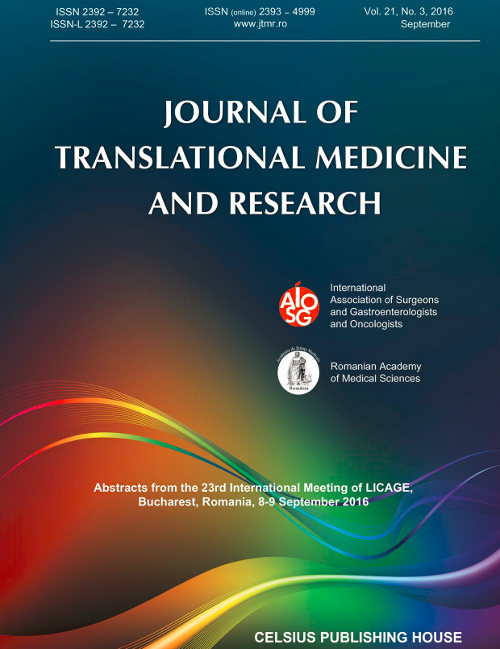Surgery, Gastroenterology and Oncology
Official journal of the International Association of Surgeons, Gastroenterologists and Oncologists

|
|
Thrombotic Complications in Cirrhotic Patients: Balancing Risks and Benefits of Anticoagulation Treatment
The risk of excessive bleeding and thrombotic complications coexist in cirrhotic patients due to synthetic reduction in both pro and anticoagulants. However, investigators suggest the prevalence and consequences of thrombotic complications are underestimated. There is convincing evidence that thrombosis causes worsening portal hypertension, hepatic fibrosis and increases patient mortality.
New evidence is emerging about the benefits of treating and preventing thrombotic complications in patients with liver disease. In the absence of welldesigned trials, clinical experience has become the most consistent guide to choose and dose anticoagulant drugs in this patient population. Practical use of anticoagulants however, is hindered by the lack of simple methods to monitor drug effect. In this review, we present a concise appraisal of current evidence on the most commonly studied indications for anticoagulation in cirrhotic patients.
Information about drug action, dosing and monitoring are presented to provide a basis for clinical decision-making. The ongoing challenges in identifying therapeutic targets for treatment and monitoring drug effects are examined to highlight important clinical questions that have not yet been fully addressed.
Full Text Sources:
Abstract:
Views: 1831

New evidence is emerging about the benefits of treating and preventing thrombotic complications in patients with liver disease. In the absence of welldesigned trials, clinical experience has become the most consistent guide to choose and dose anticoagulant drugs in this patient population. Practical use of anticoagulants however, is hindered by the lack of simple methods to monitor drug effect. In this review, we present a concise appraisal of current evidence on the most commonly studied indications for anticoagulation in cirrhotic patients.
Information about drug action, dosing and monitoring are presented to provide a basis for clinical decision-making. The ongoing challenges in identifying therapeutic targets for treatment and monitoring drug effects are examined to highlight important clinical questions that have not yet been fully addressed.
Full Text Sources:
Abstract:
Views: 1831

Watch Video Articles
For Authors
Journal Subscriptions

Current Issue
Mar 2024
Supplements
Instructions for authors
Online submission
Contact
ISSN: 2559 - 723X (print)
e-ISSN: 2601 - 1700 (online)
ISSN-L: 2559 - 723X
Journal Abbreviation: Surg. Gastroenterol. Oncol.
Surgery, Gastroenterology and Oncology (SGO) is indexed in:
e-ISSN: 2601 - 1700 (online)
ISSN-L: 2559 - 723X
Journal Abbreviation: Surg. Gastroenterol. Oncol.
Surgery, Gastroenterology and Oncology (SGO) is indexed in:
- SCOPUS
- EBSCO
- DOI/Crossref
- Google Scholar
- SCImago
- Harvard Library
- Open Academic Journals Index (OAJI)
Open Access Statement
Surgery, Gastroenterology and Oncology (SGO) is an open-access, peer-reviewed online journal published by Celsius Publishing House. The journal allows readers to read, download, copy, distribute, print, search, or link to the full text of its articles.
Surgery, Gastroenterology and Oncology (SGO) is an open-access, peer-reviewed online journal published by Celsius Publishing House. The journal allows readers to read, download, copy, distribute, print, search, or link to the full text of its articles.
Journal Metrics
Time to first editorial decision: 25 days
Rejection rate: 61%
CiteScore: 0.2
Time to first editorial decision: 25 days
Rejection rate: 61%
CiteScore: 0.2

Meetings and Courses in 2023
Meetings and Courses in 2022
Meetings and Courses in 2021
Meetings and Courses in 2020
Meetings and Courses in 2019
Verona expert meeting 2019

Surgery, Gastroenterology and Oncology applies the Creative Commons Attribution Non Commercial (CC BY-NC 4.0) license, which permits readers to copy and redistribute the material in any medium or format, remix, adapt, build upon the published works non-commercially, and license the derivative works on different terms, provided the original material is properly cited and the use is non-commercial. Please see: https://creativecommons.org/licenses/by-nc/4.0/
 IASGO Society News
IASGO Society News